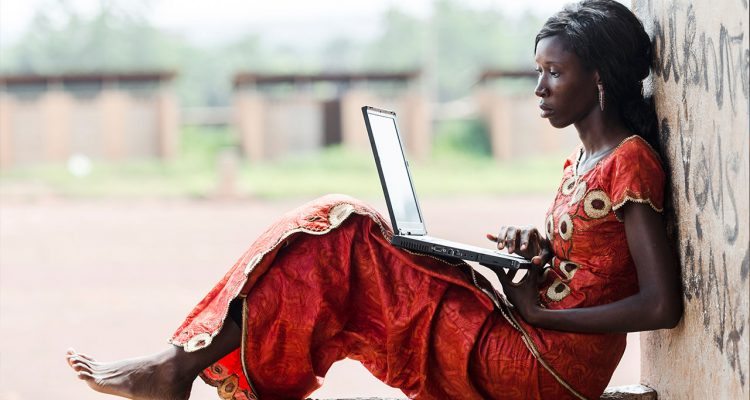En Afrique, les femmes restent encore largement à l’écart de la révolution numérique. Des entreprises comme Orange, des associations comme Women of Uganda et des fondations comme Children of Africa, créée par la première dame ivoirienne, Dominique Nouvian Ouattara, apportent des solutions.
« Les femmes sont les oubliées du digital en Afrique ». C’est le triste constat que dresse Catherine Reichert, vice-présidente communication du Comité ONU Femmes France. Déjà « lourdement touchées par la pauvreté, les aléas climatiques, le manque de soins, les violences et les crises économiques », les femmes sont en outre « les principales discriminées dans l’accès à l’éducation, à la formation et à internet », déplore l’experte en stratégie de communication digitale.
Or, malgré un taux de pénétration d’internet encore assez bas (34 % contre 80 % en Europe), l’Afrique est le continent qui connaît le taux de croissance d’internautes le plus fort dans le monde (20 % par an selon le « Global Digital Report 2018 »). Résultat : le continent participe de plus en plus à la révolution numérique, et pourrait s’imposer comme celui de l’essor de la sphère digitale.
C’est une excellente nouvelle… pour les hommes africains. Car selon les chiffres de l’Union internationale des télécommunications, seules 18,6 % des femmes ont accès à internet en Afrique, contre 24,9 % des hommes. Elles risquent ainsi d’être pénalisées par les nombreuses transformations du marché du travail.
Comme le rappelle Babacar Kane, directeur général Afrique de l’Ouest du Centre francophone d’IBM, les évolutions rapides de l’informatique, les réseaux sociaux, l’internet des objets ou encore le traitement des données massives ont permis la création de nombreux emplois. Mais elles seront également responsables de la disparition de « près de la moitié des métiers existants aujourd’hui ».
Inclusion et autonomisation
Dans ce contexte, l’accès aux formations en sciences, technologie, ingénierie et mathématiques sera la clé qui permettra aux jeunes africains d’acquérir les compétences dont ils auront besoin pour réussir.
Seulement, comme le souligne l’Unesco, « les filles sont toujours les premières à se voir refuser le droit à l’éducation malgré les progrès accomplis ces 20 dernières années », et la « division du travail entre les sexes contribue à son tour à perpétuer les inégalités sexuelles dans le travail et dans la société en général ».
Le digital est pourtant « un formidable accélérateur de l’entrepreneuriat féminin ainsi qu’un puissant vecteur d’inclusion et d’autonomisation des femmes », insiste Catherine Reichert. Démocratisée, la technologie pourrait permettre aux femmes de « rompre leur isolement géographique ou l’emprise de certaines pratiques sociales ou culturelles qui les cantonnent dans des rôles ».
Une conviction qui motive déjà un certain nombre d’acteurs à agir pour promouvoir la place des femmes dans le numérique. Au Sénégal, Orange soutient le Linguère Digital Challenge, un prestigieux concours qui récompense les meilleures start-up fondées par des femmes.
Women of Uganda et Children of Africa, la société civile se mobilise
En Ouganda, l’association Women of Uganda Network (WOUGNET) œuvre pour le développement de l’utilisation des technologies de l’information et la communication (TIC) par les femmes comme outils pour « partager l’information et aborder collectivement les problèmes ». L’association s’est fixé l’objectif de construire une société « dans laquelle les femmes sont autonomisées grâce à l’utilisation des TIC ».
En Côte d’Ivoire, la fondation Children of Africa est à l’origine de nombreux projets visant à améliorer l’accès à l’éducation et les nouvelles technologies des jeunes Ivoiriennes. Fondée par Dominique Nouvian Ouattara, première dame du pays, Children of Africa a soufflé ses 20 bougies cette année. Présente dans 12 pays d’Afrique, la fondation construit, réhabilite et équipe les infrastructures scolaires. Elle mène également des programmes sur le terrain comme les bibliobus, la distribution de kits scolaires, la mise en place de bibliothèques et surtout des centres multimédias et du matériel informatique et didactique aux établissements primaires et secondaires publics. Une manière d’initier les jeunes garçon – et les jeunes filles- au monde de l’informatique et d’internet.
Des actions concrètes qui changent le quotidien de nombreux et nombreuses jeunes tout en contribuant à transformer l’économie du continent. En effet, selon les chiffres du rapport d’Intel « Women and the Web », l’accès des femmes à Internet apporterait 18 milliards de PIB dans les pays en développement. Pour la période 2015-2020, l’inclusion des femmes représenterait une croissance économique de 170 milliards de dollars dans les pays émergents.
rudebaguette


Leave a Reply